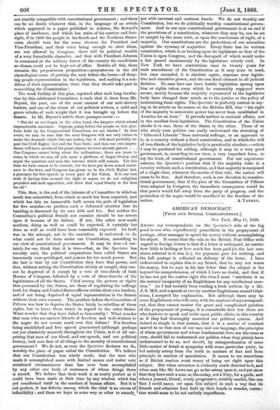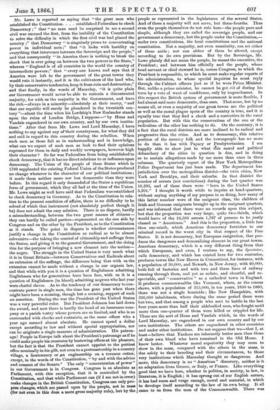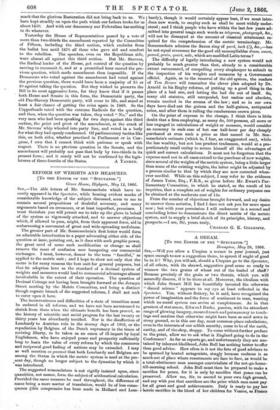AMERICAN DEMOCRACY.
[FROM OIIR SPECIAL CORRESPONDENT.]
New York, May 11, 1866. AMONG my correspondents on the Spectator's side of the big pond is one who, superfldously punctilious in the prepayment of postage, often manages to spend his money without accomplishing his object. It seems that the rule in the British Post Office with regard to foreign letters is that if a letter is underpaid, no matter how little is lacking or how much has been paid (in the last case above referred to it was 7s.), the payment goes for nothing, and the full postage is collected on delivery of the letter. I have endeavoured to explain this to my friend, that he may not waste his money, but he says in his last letter that the subject is far beyond his comprehension, of which I have no doubt, and that if he has not got the matter right this time I must "attribute it to the natural incapacity of an Englishman for any intellectual exer- tion." As I had recently been reading a book written by a Mr. J. S. Mill, and a speech or two by another Englishman named Glad- stone, I accepted the explanation. But although there may be some Englishmen who will own, with the candour of mycorrespond- ent, that they cannot master the great and complicated question of the prepayment of postage, it is remarkable how few there are who hesitate to speak and write upon public affairs in this country as if they had thoroughly mastered our political system. And indeed so simple is that system, that it is a matter of constant marvel to us that men of our race and our language, the principles of whose government and whose fundamental laws are the same as ours, should fail to understand our politics when they plainly-have endeavoured to do so, and should, by misapprehension of some little matter of detail or sympathy with some particular party, be led entirely astray from the truth in matters of fact and from principle in matters of speculation. It seems to me sometimes as if British readers must weary of being set right upon this subject. Bat when attention is evidently much directed to it, and when men like Mr. Lowe can go so far astray upon it, and yet show that they have such a man as Macaulay, not a Tory, for a guide, and when a journal, liberal, wisely progressive, notably candid, like one that I could name, err upon this subject in such a way that its friends and admirers here hold up their hands in wonder, correc- tion would seem to be not entirely superfluous.
Mr. Lowe is reported as saying that "the great men who established the Constitution. . . . established Federalism to check Democracy ; " that "no man need be surprised to see a second civil war succeed the first, from the inability of the Constitution to solve the difficulty in which the first civil war had placed the country ;" that Democracy "is singularly prone to concentrating power in individual men ;" that "it looks with hostility on everything that intervenes between the Sovereign and the people," and that consequently "in America there is nothing to break the shock that is ever going on between the two powers in the State," whereas "England is of all countries in the world the country of intermediate powers ;" that "every one knows and says that if America were left to the government of the great towns they would ruin it instantly, and it is the cultivators of the land who, by their conservative tendencies, keep it from ruin and destruction;" and that finally, in the words of Macaulay, "it is quite plain our Government would never be able to restrain a discontented majority, for with us the majority is the Government, and have the rich—always in a minority—absolutely at their mercy, "and that our republic will surely be plundered in the twentieth cen- tury "—about the time when his Lordship's New Zealander stands upon the ruins of London Bridge, I suppose—" by Huns and Vandals engendered in our own country, and by our own institu- tions." After that from Mr. Lowe and Lord Macaulay, I have nothing to say against any of 'their countrymen, for what they did and said in regard to this country during the rebellion. When
such men as those fail so in understanding and in knowledge, what can we expect of such men as look to find their opinions expressed for them in daily and weekly newspapers, however high their character? So far was Federalism from being established to check democracy, that it has no direct relations to or influence upon democracy. The Union of the people of these States which in 1789 supplanted the existing Federal Union of the States produced no change whatever in the character of our political institutions ; it made them neither more nor less democratic than they were before. In this regard it only demanded of the States a republican form of government, which they all had at the time of the Union. Mr. Lowe might as well have said that Federalism was established to check democracy in Germany. As to the Constitution in rela- tion to the present condition of affairs, there is no difficulty to be solved of which that instrument (not absolutely perfect though it be) does not admit the easy solution. There is no dispute, hardly a misunderstanding, between the two great masses of citizens— they can hardly be called parties—represented on the one side by Congress and on the other by the President, as to the Constitution as it stands. The point in dispute is whether circumstances justify a change in the Constitution so radical as to be almost subversive—the taking the control of citizenship and suffrage from the States, and giving it to the general Government, and the doing this for the purpose of bringing a new element into the nation— the negro. The struggle in the United States is very much what it is in Great Britain—between Conservatives and Radicals about an extension of the suffrage, the difference being that with us the extension cannot be made without a change in our organic law, and that while with you it is a question of Englishmen admitting Englishmen who for generations have been free, with us it is a question of Englishmen (in blood) admitting negroes who last year were chattel slaves. As to the tendency of our democracy to con- centrate power in single men, the time has gone past when there might have been a seeming, though but a seeming, support of such an assertion. During the war the President of the United States was a very powerful ruler. But President Johnson has laid down the sword, and now there is hardly the head of an insurance com- pany or a parish vestry whose powers are so limited, and who is so surrounded with checks and restraints, as the same officer who a year ago seemed almost absolute. He cannot spend a dollar except according to law and without special appropriation, nor can he originate a single measure of administration. His patron- age! People in Europe talk about the President's patronage as if he could make people his creatures by bestowing offices at his pleasure, but the fact is that the President cannot appoint to the pettiest office nominally in his gift, not even to a postmastership in a country village, a lieutenancy or jui engineership on a revenue cutter, except, in the words of the Constitution, "by and with the advice and consent of the Senate." The only "concentration of power" in our Government is in Congress. Congress is as absolute as Parliament, with this exception, that it is controlled by the Constitution, and that while Parliament can (if I am not in error) make changes in the British Constitution, Congress can only pro- pose changes, which are passed upon by the people, not in mass (for not even in this does a mere grow majority rule), but by the • people as represented in the legislatures of the several States. And of these a majority will not serve, but three-fourths. Thus even the people themselves do not rule here—the people pure and simple, although they are called the sovereign people, and our government a democracy, but the people under the Constitution,— under two constitutions, the local constitutions and the national constitution. Not a majority, not even unanimity, can set either of these aside ; nor can either of them be altered, except according to its own provisions. But by tha Sovereign, Mr. Lowe plainly did not mean the people, he meant the executive, the President ; and between him officially and the people, whose head servant or chief steward he is, comes Congress, to which the President is responsible, to which he must make regular reports of his administration, to whose special inquiries he must reply through the Cabinet officers just as if he were Prime Minister. But, unlike a prime minister, he cannot be got rid of during his term by a vote of want of confidence, only by impeachment. In this respect the British system of government is more flexible, I had almost said more democratic, than ours. That some, but by no means all, or even a majority of our great towns are the political as well as the moral plague spots of the country is true, and it is equally true that they find a check and a corrective in the rural population. But with this the conservatism of the one or the radicalism of the other has nothing to do. On the contrary, it is a fact that the rural districts are more inclined to be radical and progressive than the cities. And as to democracy, this relative position of the country folk and the townspeople has no more to do than it has with Papacy or Presbyterianism. I am happily able to show just to what ttis moral and political debauchery of the cities in question is due, and in doing so to sustain allegations made by me more than once in these columns. The quarterly report of the New York Metropolitan Police Department has just been made. The department has jurisdiction over the metropolitan district—the twin cities, New York and Brooklyn, and their suburbs. In that district the number of arrests (not convictions) during the last quarter was 16,593, and of these there were "born in the United States 5,301." I thought it worth while to inquire at head-quarters, without saying anything of my purpose in so doing, how many of this latter number were of the emigrant class, the children of Irish and German emigrants brought up in the emigrant quarters, and was informed that there were no records upon this subject, but that the proportion was very large, quite two-thirds, which would leave of the 16,593 arrests 1,767 of persons to be justly classed as "Americans." And this is the proportion, a little less than one-ninth, which American democracy furnishes to our criminal record in the worst city in that respect of the Free States. It is not democracy, but European emigration, that pro- duces the dangerous and demoralizing element in our great towns. American democracy, which is a very different thing from that which Europeans, and even, I venture to say, the Spectator, calls democracy, and which has existed here for two centuries, produces towns like New Haven in Connecticut, for instance, with a population of 30,000, and Newark, in New Jersey, with 60,000, both full of factories and with two and three lines of railway running through them, and yet as sedate, and cheerful, and re- spectable, and " conservative " as a cathedral town in England. It produces commonwealths like Vermont, where, as the census shows, with a population of 315,000, in ten years, 1850 to 1860, there was not a single homicide ; like New Hampshire, with 326,000 inhabitants, where during the same period there were but two, and that among a people who sent to battle in the last four years more than half their ablebodied men, who fought until more than one-quarter of them were killed or crippled for life. These are the sort of Huns and Vandals which, in the words of Lord Macaulay, are engendered in our own country and by our own institutions. The others are engendered in other countries and under other institutions. Do not suppose that we—that I, at least—believe that Yankees are inherently better men than those of their own blood who have remained in the Old Home. I know better. Whatever moral superiority they may seem to show in the mass, compared with the others in the mass, is due solely to their breeding and their circumstances, to those very institutions -which Macaulay thought so dangerous. And more, this democracy is no "American" discovery, neither is it an adaptation from Greece, or Italy, or France. Like everything good that we have here, whether in politics, in society, in law, in literature, it is English ; it has sprung out of our English nature, it has had room and verge enough, moral and material, in which to develop itself according to the law of its own being. It all came to us from the men of the Commonwealth. There was
much that the glorious Restoration did not bring back to us. We have kept steadily on upon the path which our fathers broke for us about 1650. And with our democracy our Federalism has nothing to do whatever.
Yesterday the House of Representatives passed by a vote of more than two-thirds the amendment reported by the Committee of Fifteen, including the third section, which excludes from the ballot box until 1870 all those who gave aid and comfort to the rebellion. The speeches, even on the Republican side, were almost all against this third section. But Mr. Stevens, the Radical leader of the House, got control of the question by moving to recommit it, and at a prescribed hour moved the pre- vious question, which made amendment then impossible. If the Democrats who voted against the amendment had voted against the previous question, there would have been a majority of 35 or 40 against taking the question. But they wished to preserve the Bill in its most aggressive form, for they know that if it passes both House and Senate in this form, the Democratic party, the old Pro-Slavery Democratic party, will come to life, and stand at least a fair chance of getting the reins again in 1868. So the Copperheads voted with the extreme Radicals for the question, and then, when the question was taken, they voted "No," and the very men who had been speaking for two days against this third section, the point and pivot of the amendment, at the crack of Mr. Stevens' whip wheeled into party line, and voted in a body for what they had openly condemned. Of parliamentary tactics like this, on both sides, whether practised in Parliament or in Con- gress, I own that I cannot think with patience or speak with respect. There is no ptevioua question in the Senate, and the amendment will probably not pass that body by two-thirds in its present form ; and it surely will not be confirmed by the legis-
latures of three-fourths of the States. A YANKEE.
































 Previous page
Previous page